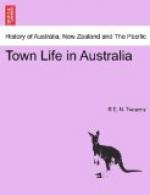The most interesting, history is that of Victoria, the youngest colony of the three, which up to the time of the gold discoveries formed a district of New South Wales, not inaptly named by its first explorer ’Australia Felix.’ Practically, its history may be said to date from these gold discoveries in 1851. For the next five years adventurers of all nations and classes flocked to the diggings, and quiet settlers from other colonies left their sheep to look after themselves while they hastened to reap a share of the golden harvest. Fortunately the diggings only gave place to mines which are still a staple of wealth. But during the period of the American war the gold tide ebbed too swiftly, leaving high and dry not only diggers, but the thousand-and-one classes who were indirectly dependent upon the gold supply. The better portion of these found occupation on the land—the richest in Australia, though neglected during the gold mania. But there remained a large number without any visible means of support, and not particularly inclined to go out of their way to find any. What to do with this large class of ‘electors’ became the question of the day, until in 1865 Sir James M’Culloch introduced a scheme for making work for them. By turning the tariff into an industrial incubator he forced manufactures into existence, and gave employment to those who had nothing better to do. It was in this manner, to meet a temporary crisis, and with no deliberate economical purpose, that the thin edge of the protectionist wedge was introduced. When once the purpose for which the duties had been imposed was served, the originators of protection in Victoria thought they could be quietly dropped. Needless to say, it was easier to call in the spirit of Protection than to lay it again. The gold produce continued to decrease, and the cry was for more duties and heavier duties, until a please-the-people Ministry extended the list to every possible article of manufacture, and raised the duty to a prohibitive amount-for many articles as high as 271/2 ad valorem. The colony has now committed itself to an almost irrevocable extent. Even the relative idea of imposing duties temporarily for the sake of giving new industries a start, which marked the second stage of public opinion,




